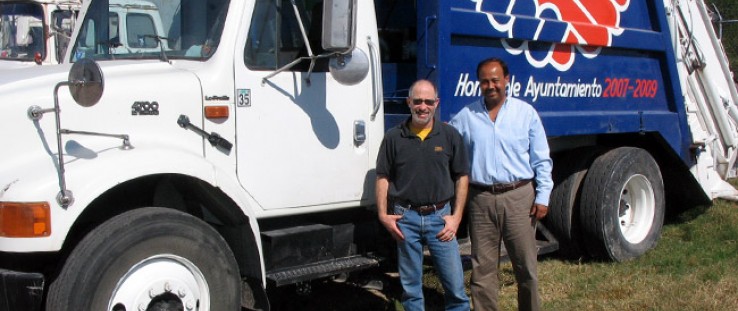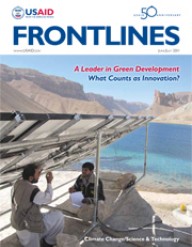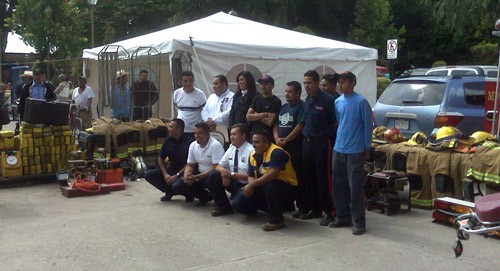 Campbell Public Works Director Robert Kass, left, and former Rioverde Mayor Sergio Gama Dufour in Rioverde with one of the donated and repainted garbage trucks
Municipality of Rioverde
Campbell Public Works Director Robert Kass, left, and former Rioverde Mayor Sergio Gama Dufour in Rioverde with one of the donated and repainted garbage trucks
Municipality of Rioverde
 Campbell Public Works Director Robert Kass, left, and former Rioverde Mayor Sergio Gama Dufour in Rioverde with one of the donated and repainted garbage trucks
Municipality of Rioverde
Campbell Public Works Director Robert Kass, left, and former Rioverde Mayor Sergio Gama Dufour in Rioverde with one of the donated and repainted garbage trucks
Municipality of Rioverde
Rioverde, a small city in central Mexico, struggled to find the resources it needed to protect its growing number of citizens. The city’s emergency services were especially overstretched. From Mayor Sergio Gama Dufour’s perspective, the city was in dire need of technical expertise and equipment.
Through a city-exchange program sponsored by USAID, Dufour received the help he needed from a city in California to make Rioverde a safer place to live.
The city of Campbell, through its partnership with Rioverde, provided training and technical assistance to improve both its sanitation and emergency services. Campbell also donated surplus garbage trucks and emergency response equipment, even after its formal partnership with Rioverde had ended.
“The support we received has made it possible to improve public safety in Rioverde,” said Hilario Vasquez Mendez, Rioverde’s fire chief, “not just because of the materials and equipment we received, but also through our exposure to professional administration and procedures that have put us on the path to a more professional fire department.”
Cities around the world face issues that are strikingly similar. From public education to road repair and garbage collection, municipal authorities struggle to make the most efficient use of their cities’ limited resources. Many American cities are well-poised to share their expertise with their counterparts in other countries that struggle to solve similar problems with fewer resources.
Lasting Partnerships
A USAID program implemented by the International City/County Management Association (ICMA) built on this idea by supporting partnerships between cities and counties in the United States with local governments in developing countries.
Originally called Resource Cities, and then CityLinks, the program was designed in 1997 to leverage American expertise in municipal management. While the program officially ended in 2008, lasting partnerships continue to yield results today.
In Albania, the city of Tirana was able to use the environmental management experience of Catawba County, N.C., to streamline its collection of solid waste. Today Tirana has a recycling program, and has instituted a clean-up and recycling day to increase citizens’ awareness of their crucial involvement in waste disposal.
Three years after their formal USAID-funded CityLinks partnership ended, Catawba County and Tirana officials continue to work with each other on technical and management issues such as updating the city’s waste collection operations and introducing a recycling program. “It is our aspiration to improve the city of Tirana’s environment, particularly through advancements in solid waste management,” said Barry Edwards, Catawba County’s director of utilities and engineering.
Professional and personal relationships established between Catawba County and Tirana; Port Townsend, Wash., and Umag, Croatia; West Bend, Wis., and Pazardjik, Bulgaria; Golden, Colo., and Veliko Turnovo, Bulgaria; and Tigard, Ore., and Samarinda, Indonesia, all continued beyond the formal, USAID-funded partnership.
The Port Townsend/Umag partnership focused on the development of a reuse plan for a former military base in the community. The first phase of the redevelopment plan is now underway and includes construction of a new daycare and preschool. In addition, Umag has invited a Slovakian city, Ruzinov, to join in its continued relationship with Port Townsend. The three cities will work together to draw lessons from Port Townsend’s waterfront redevelopments in the northwest.
Veliko Turnovo, a city in north central Bulgaria, also benefited from the program. The city’s history and unique architecture attract many tourists, but at the time of its match with the city of Golden, Colo., in late 2000, the Bulgarian city was suffering the effects of a nationwide economic downturn.
Building on Golden’s experience with similar challenges, the two cities jointly created an urban upgrading plan for managing and improving the city’s damaged roads and sidewalks. Veliko Turnovo used the plan to accurately assess the most feasible and cost-effective repairs. Because the city’s roads and sidewalks are now safer and more accessible, Veliko Turnovo has become a more attractive destination for local tourists. In addition, by improving the city’s financial management practices, the municipality has succeeded in accessing additional funds from the central government and a bank loan to invest in more upgrades.
“We are very proud that Golden’s infrastructure management system was recognized and supported by USAID for replication across Bulgaria,” said Mike Bestor, Golden’s city manager.
All told, more than 75 partnerships were formed through the CityLinks program in more than 20 countries throughout Asia, Latin America, Europe, and Africa.










Comment
Make a general inquiry or suggest an improvement.